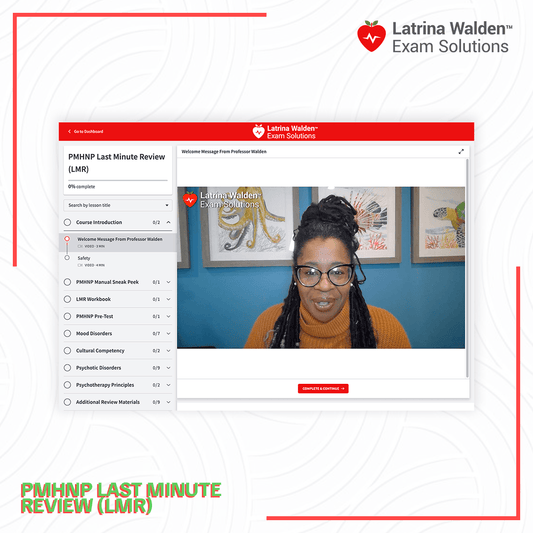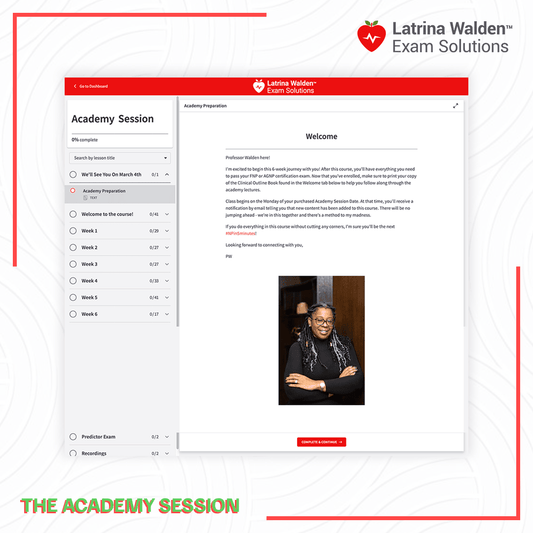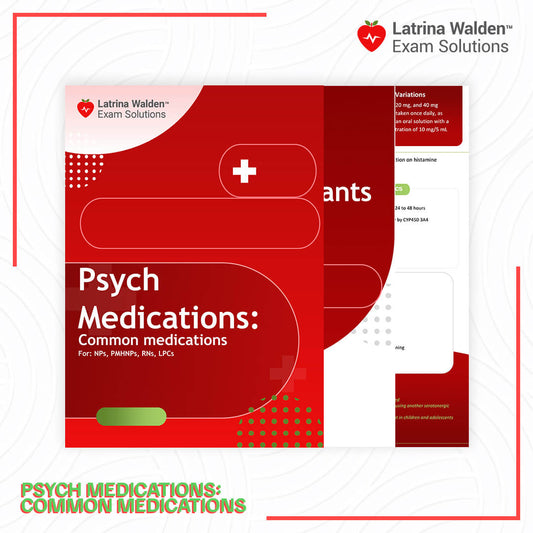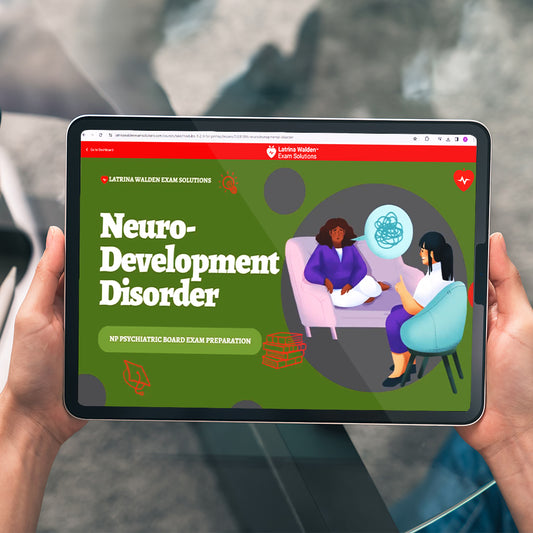Are you a nurse practitioner student aspiring to become a Psychiatric-Mental Health Nurse Practitioner (PMHNP)? The journey to becoming a PMHNP is undoubtedly challenging, especially with the PMHNP certification exam looming in the distance. In this post, we’ll answer one of the most common questions about the exam: “Is the PMHNP exam difficult?” and provide insights into eligibility requirements, pass rates, and effective strategies to enhance your chances of success.
Table of Contents
Eligibility Requirements: Setting the Foundation
ANCC Eligibility Requirements
AANP Eligibility Requirements
ANCC Exam Content
AANP Exam Content
Exam Scoring
PMHNP Exam Pass Rates
Strategies for Success: Mastering the PMHNP Exam
Eligibility Requirements: Setting the Foundation
Before you set out to take the PMHNP board exam, make sure you meet ANCC or AANP eligibility criteria. Not only are these requirements for the certifying organizations, but they’re also great steps to gaining experience that will support your success on the PMHNP certification exam. Below is a brief overview of eligibility requirements, but you can also visit the ANCC and AANP websites for more detailed information.
ANCC Eligibility Requirements
Applicants for the ANCC PMHNP exam must hold a current, active RN license. They must have a PMHNP master’s, post-graduate certificate, or DNP from an accredited institution. This must include a minimum of 500 faculty-supervised clinical hours, and three separate, graduate-level, APRN Core courses in designated topics. Finally, you must have completed clinical training in at least two psychotherapeutic treatment modalities.

AANP Eligibility Requirements
Applicants for the AANP PMHNP exam must have completed a nationally accredited graduate, postgraduate, or doctoral PMHP educational program, including a minimum of 500 clinical practice hours. They must complete the APRN Core, including advanced physical assessment, advanced pharmacology, and advanced pathophysiology. A current professional nursing license is required to process your application.
PMHNP Exam Overview
ANCC Exam Content
The ANCC board exam covers a comprehensive range of material that reflects the practice of nurse practitioners. This material is organized into five key categories: scientific foundation, advanced practice skills, diagnosis and treatment, psychotherapy and related theories, and ethical and legal principles.
AANP Exam Content
The two content domains on the AANP PMHNP exam are practice (I) and patient age (II). Domain I is further divided into content categories that you may recognize from the older AANP exams: assessment, diagnosis, planning, and evaluation. Let’s look at each of these a little more closely below.
Assess
Assessment questions test your ability to establish and evaluate your relationship with your patients, including your ability to identify barriers to learning and care. This evaluates your ability to perform developmentally appropriate evaluations, and order or administer screening tools and diagnostic or laboratory tests.
Diagnose
Now you’ll need to demonstrate your skill at interpreting the results of assessments you may have ordered, establish a diagnosis, and develop differential diagnoses.
Evaluate
Evaluation-type questions test your ability to assess your own plan of care based on outcomes. This includes modifying your plan when needed and engaging in quality improvement initiatives. You should be able to demonstrate practice in accordance with applicable ethical and legal requirements, as well as conformance to applicable scope and standards.
Exam Scoring
After you take your exam, a raw score is generated; this is the total number of correct answers. That score is then converted into a scaled score, and in order to pass, you must get at least a 350 (ANCC) or 500 (AANP). The process of converting raw scores into scaled scores adjusts for the difficulty of the exam. Since different versions of the ANCC and AANP PMHNP exams may have slight variations in difficulty, scaling scores ensures that candidates are scored fairly. This means that candidates who take different versions of the exam should receive comparable scores, reflecting their true level of knowledge and skill.
PMHNP Exam Pass Rates
The ANCC board exam is made up of 175 questions of various formats. These include drag-and-drop questions, extended multiple-choice, and “hot spot” or image-based questions. But don’t forget, only 150 of these are scored. The remaining 25 questions are considered “pretest” questions, and are questions ANCC is assessing for use on future exams. To pass the ANCC exam, you must get at least a scaled score of 350.
Similarly, the new AANP PMHNP exam contains a total of 135 scored multiple-choice questions and 15 pretest questions. To pass, you must get at least a scaled score of 500.
So how many people pass the PMHNP exam? Since AANP just began accepting applications for the new PMHNP exam in January 2024, we don’t yet have access to the score statistics and pass rates. However, here’s a look at two different years of ANCC PMHNP exam stats, provided by ANCC.
|
Year |
Total Tested |
Total Passed |
Pass Rate |
|
2016 |
1,550 |
1,364 |
88% |
|
2022 |
7,476 |
6,789 |
91% |
As you can see, the majority of well-prepared candidates achieve a passing score.

Strategies for Success: Mastering the PMHNP Exam
Regardless of which exam you choose to take, preparing for the PMHNP exam requires a strategic and comprehensive approach. Here are some tips to help you navigate the preparation process successfully.
-
Start Early and Plan Strategically
Begin your exam preparation early, ideally during your final semester of the PMHNP program. Develop a study schedule that covers all content areas, allowing for a comprehensive review without feeling overwhelmed. Allocate specific time slots for each domain to ensure a balanced and thorough review.
-
Use Reliable Study Resources
Utilize reputable study materials, such as review books, practice exams, and online resources like LWES’s streamlined Last Minute PMHNP Review course! ANCC and AANP also provide valuable study materials. Investing in high-quality review materials specifically designed for the PMHNP exam can ensure that the effort you put into studying is maximized!
-
Focus on Weak Areas
Regularly assess your knowledge and identify weak areas. After taking practice exams, focus on the areas where you struggled. Review relevant content, seek clarification, and reinforce your understanding of challenging topics.
-
Collaborate and Seek Support
Join study groups or connect with fellow NP students preparing for the PMHNP exam. Sharing insights, discussing challenging concepts, and providing mutual support can enhance your understanding and motivation. .
-
Take Care of Yourself!
Maintaining a healthy lifestyle is a key part of the exam prep phase. Getting adequate sleep, exercising, and managing stress will set you up for success not only on long study days, but on exam day too!
Remember, success on the PMHNP exam is not just about memorizing information, but also about understanding the application of knowledge in real-world scenarios. By adopting a well-rounded approach to preparation, you’re sure to succeed on the exam and in your future role as a PMHNP!










